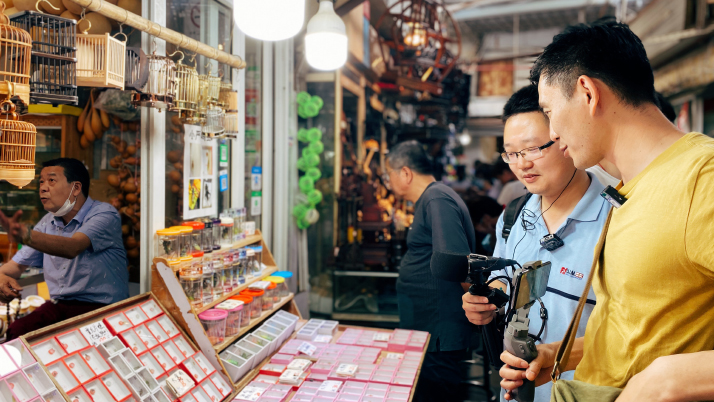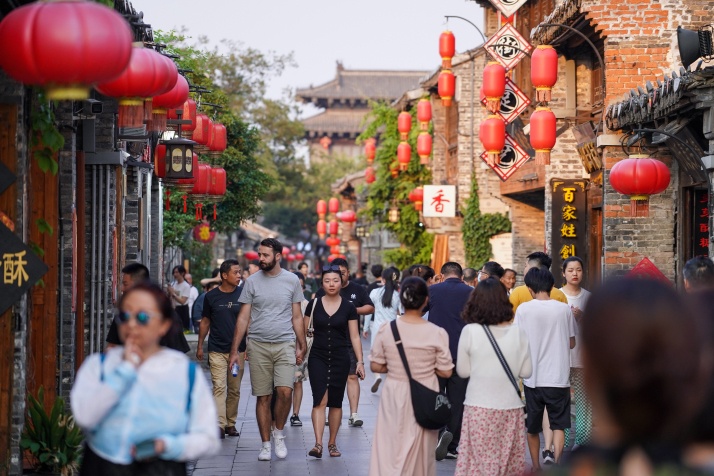| China |
| A city walk is the cool young Chinese thing to do | |
|
|
 City walker Wang Yuezhou (second right) explores a pet market in Shanghai in 2020 (COURTESY PHOTO)
As one ancient Chinese saying goes, "There's no beautiful scenery near where you always hang around." Thirty-two-year-old Shanghai resident Wang Yuezhou used to agree until he discovered the city walk concept and learned to appreciate the beauty of every corner of the city where he was born and raised. In 2014, Wang stumbled across the concept when he was invited to join a program initiated by Chinese news portal ThePaper.cn, which gathered people with an interest to explore and study the city. After following walking routes leading across different areas of the city, for example, to old residential areas or places that used to be part of an industrial zone, these people sat down to exchange their observations and discoveries. Some went on to write about their trips, while others took photos, all of which were then published on ThePaper.cn. "Even though I'm Shanghainese, I didn't know all these places because I neither work nor live in these areas. The walks gave me a chance to realize how interesting Shanghai could be," Wang told Beijing Review. "There are many sides to a city, and changes are taking place every second; roaming around and discovering the 'unexplored' is a way of respecting the city." Urban legends Instead of aimlessly strolling around, a city walk follows carefully planned routes to explore urban history, culture and environment. Usually, a small group of people follow a guide along specific paths in the cities they are living or traveling in. City walks have become a trending tag on Chinese social media, with many young partakers posting trip-related photos, routes and thoughts online. Hashtag "holiday city walk" had raked in more than 470 million views by mid-July on hugely popular Chinese lifestyle and e-commerce app Xiaohongshu (Little Red Book). "The city is one big playground," a netizen posted on major Chinese microblogging platform Weibo. In 2019, Wang went on one of his most memorable walks. Set in 800-year-old Jiading, one of Shanghai's 16 districts, this was his first time guiding a group. He'd spent a few months researching and came up with a plan for the tour. But it's what wasn't in the blueprint that impressed him most. "I walked into the residence of Wang Jingming (1668-1721), the district's first zhuangyuan, and one of his descendants was still living there," Wang said. "You could still see and sense this family's glorious past." Zhuangyuan was the title given to the scholar who achieved the highest score on the highest level of the imperial examination in ancient China. Those who received the accolade would usually go on to assume official positions. Exploring the history and culture of a city is one way for walkers to deepen their understanding of an urban surrounding. "Personal experience is more direct and leaves a deeper impression than watching videos or reading books. Unlike traditional forms of travel, a city walk takes less time and delves deeper into the history of a specific spot," Beijing-based walking fan Wang Zixuan told Beijing Review. "The culture of a city lives in its streets and alleys, among the ordinary public. By going on a city walk, people can directly communicate with urban culture and immerse themselves in it," Zheng Peiyuan, a member of the research institute of culture and history of Guangdong Province, told local news portal Ycwb.com.  A tourist site in Yangzhou, Jiangsu Province, buzzes with visitors on June 14 (XINHUA)
A way of life "You just wander around the streets of the city, choose whether to turn left or right at the intersection based on where you feel like going, use your footsteps and camera to measure and record the city, and explore fun and chill small places," a poster on Xiaohongshu read. This comment was echoed by a host of fans who consider the city walk concept a reflection of life attitude. According to DTCaijing, a data research media based in Shanghai, culture, scenery, food and urban life are among the most attractive aims for city walkers. Routes involving some scenic spots have received frequent social media mention, such as the West Lake, a must-see for visitors in Hangzhou, Zhejiang Province, where lotus flowers blossom in summer, and Chengdu's Longquan Mountain Urban Forest Park in Sichuan Province—considered a perfect summer resort as it's much cooler there than in other places around Chengdu City. Cities are stepping up efforts to make themselves more walking-friendly. For example, on July 13-14, more than 200 government workers from the housing and urban development departments of Hubei Province, went on a special city walk in Hubei's Yichang City to learn more about local greening and related construction. Several of the city's signature city walk routes have rapidly gained online (and offline) fame thanks to the city's renovation undertakings. For example, an art exhibition area by a lake-side park was renovated from an old warehouse; a wetland park has been equipped with a small stretch of grassland, a football field and a swimming pool, meeting the residential need for public spaces and becoming new places for both the residents as well as city walkers to spend some free time. Not just data roaming Wang Yuezhou believes the city walk does not have a fixed definition and works differently for different people. "The most obvious benefit is that you keep fit with long walks," he said. "And for me, conducting in-depth research of my city satisfies my curiosity. Witnessing the historical changes and the development of a city is a way of passing on its legacy." He added that artists and writers can gain much creative inspiration from observing the city. "In a broader sense, it is a way for government employees to find out what residents need and collect public opinion, integrating their findings into urban planning," Wang said. "Scholars focusing on the study of a city, or a specific area of the city, as well as senior residents, could also join the city walks so that they can help other partakers learn more about the city." (Print Edition Title: Hot to Trot) Copyedited by Elsbeth van Paridon Comments to luyan@cicgamericas.com |
|
||||||||||||||||||||||||||||||
|